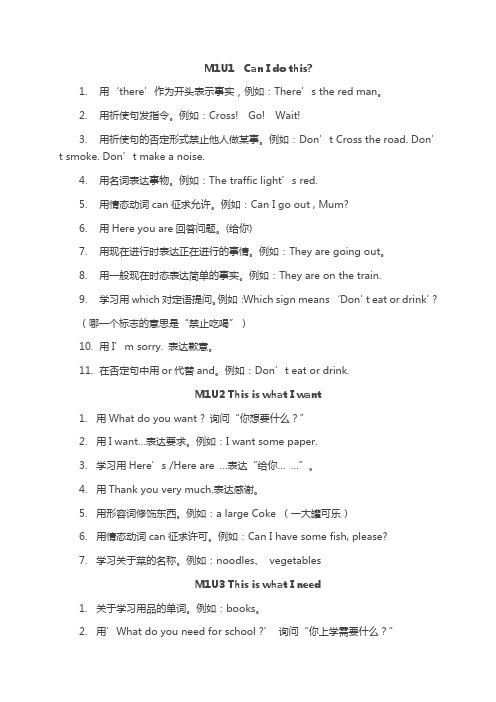牛津英语五年级上册知识点整理
- 格式:doc
- 大小:45.00 KB
- 文档页数:14

M1U1 Can I do this?1. 用‘there’作为开头表示事实,例如:There’s the red man。
2。
用祈使句发指令。
例如:Cross! Go! Wait!3. 用祈使句的否定形式禁止他人做某事。
例如:Don’t Cross the road。
Don't smoke。
Don’t make a noise.4。
用名词表达事物。
例如:The traffic light’s red.5。
用情态动词can征求允许。
例如:Can I go out , Mum?6. 用Here you are回答问题。
(给你)7. 用现在进行时表达正在进行的事情。
例如:They are going out。
8。
用一般现在时态表达简单的事实。
例如:They are on the train。
9. 学习用which对定语提问。
例如:Which sign means ‘Don’t eat or drink’?(哪一个标志的意思是“禁止吃喝”)10. 用I’m sorry. 表达歉意。
11. 在否定句中用or代替and。
例如:Don’t eat or drink.M1U2 This is what I want1. 用What do you want ? 询问“你想要什么?”2. 用I want…表达要求。
例如:I want some paper.3. 学习用Here’s /Here are …表达“给你… …”。
4。
用Thank you very much.表达感谢。
5。
用形容词修饰东西。
例如:a large Coke (一大罐可乐)6。
用情态动词can征求许可。
例如:Can I have some fish,please?7。
学习关于菜的名称。
例如:noodles、vegetablesM1U3 This is what I need1。
关于学习用品的单词。
例如:books.2。
用’What do you need for school ?' 询问“你上学需要什么?"3。

牛津英语五年级上册知识点整理Jump into the lake (现在分词)。
we can swim in the cool water.I am afraid of flying (动名词)。
so I always choose to travel by train.She is good at cooking nice food (名词)。
and she enjoys trying different recipes.He wants to drive a taxi (不定式)。
because he likes to meet new people.2.改写句子,使其主语为第三人称单数形式。
I want to be a doctor。
→ He wants to be a doctor.We want to help people。
→ They want to help people.You are good at playing soccer。
→ She is good at playing soccer.3.用正确的动词形式填空。
My grandparents (like) to take a walk in the park every morning.What (do) you want to be when you grow up?She (wants) to e a teacher because she loves children.The singer (perform) on stage every night.4.将下列动词变成名词形式。
teach → teachersing → singerplay → playercook → cook or cooker (depending on the context)1) James wants to e a doctor so that he can help people.2) Ms Fang is a Science teacher who teaches us.3) What does your brother want to be?4) May likes cooking and wants to e a cook.5) I am good at singing and want to e a singer.6) My father is a taxi driver and enjoys driving.Unit 2 Review1.Phrasescome to schooltake the trainget off (the train)on foot/walkafter half an hourtake the school bus/by school busbus2.Sentence patterns1) Use "How do you come to school?" to ask about someone's n to school.2) Use "I come/go to school。

五年级上册复习内容五年级上册复习内容模块纵览模块纵览Module1 Ge ng to know each other 本模块是关于认识自己及了解他人。
本模块是关于认识自己及了解他人。
Unit1 My future 介绍了各种职业,探讨未来想从事的职业。
介绍了各种职业,探讨未来想从事的职业。
介绍了各种职业,探讨未来想从事的职业。
Unit2 Going to school 介绍了上学或上班的出行方式。
介绍了上学或上班的出行方式。
Unit3 My birthday 介绍了有关生日的庆祝活动。
介绍了有关生日的庆祝活动。
介绍了有关生日的庆祝活动。
Module 2 Rela onships 本模块是关于自己与家长及朋友的关系。
本模块是关于自己与家长及朋友的关系。
Unit4 Grandparents 介绍了和祖父母一起进行的活动。
介绍了和祖父母一起进行的活动。
Unit 5 Friends 介绍了自己和好朋友之间的相同和不同之处。
介绍了自己和好朋友之间的相同和不同之处。
介绍了自己和好朋友之间的相同和不同之处。
Unit 6 Family life 介绍了不同的房间及家庭生活。
介绍了不同的房间及家庭生活。
Module 3 Out and about 本模块是关于丰富多彩的户外生活。
本模块是关于丰富多彩的户外生活。
Unit 7 At the beach 介绍了海边休闲度假时所做的一些事情。
介绍了海边休闲度假时所做的一些事情。
Unit 8 An ou ng 描述了一次“寻宝”活动。
描述了一次“寻宝”活动。
Unit 9 Around the city 是关于问路及指路。
是关于问路及指路。
Module 4 The natural world 本模块是关于大自然和人们日常生活之间的关系。
本模块是关于大自然和人们日常生活之间的关系。
Unit 10 Wind 认识风的各种状态。
认识风的各种状态。
认识风的各种状态。
Unit 11 Water 介绍了水的各种用途。

五年级上册复习资料江苏译林(牛津)版英语五年级上册知识点整理Unit 1 Goldilocks and the three bears一、单词(默写)1.bear熊2.forest森林3.there(与be连用)有4.house房子5.soup汤6.just right正合适 7.room房间 8.hard硬的 9.soft柔软的 10.afraid害怕的11. their他们的 12.her她(宾格)13.help救命 14.beside在……旁边 15.between在……中间 16.really真正地 17.then然后 18.find找到,发现 19. in front of在……前面二、词组(默写)1、in the forest在森林里2、 a beautiful house一座漂亮的房子3、 hungry and thirsty又饿又渴4、some soup一些汤5、 too cold/hot太冷/热6、 in the room在房间里7、too hard/soft太硬/软8、three bears 三只熊9、have some cakes吃些蛋糕 10、in the kitchen在厨11、 in the fridge在冰箱里 12、find their cousin发现他们的表弟三、句型(默写)1. There is a house in the forest.在森林里有一个房子。
2. There is some soup on the table.在桌子上有一些汤。
3. There are three bears in front of her.在她前面有三只熊。
4. This soup is too cold.这汤太冷了。
5. What a beautiful house! 多么漂亮的房子!6. She is hungry and thirsty.她是又饿又渴。
7.Bobby cannot(can’t) see any cakes in the fridge. 波比看不到冰箱里有蛋糕。

M1U1 Can I do this?1. 用‘there’作为开头表示事实,例如:There’s the red man。
2. 用祈使句发指令。
例如:Cross! Go! Wait!3. 用祈使句的否定形式禁止他人做某事。
例如:Don’t Cross the road. Don’t smoke. Don’t make a noise.4. 用名词表达事物。
例如:The traffic light’s red.5. 用情态动词can征求允许。
例如:Can I go out , Mum?6. 用Here you are回答问题。
(给你)7. 用现在进行时表达正在进行的事情。
例如:They are going out。
8. 用一般现在时态表达简单的事实。
例如:They are on the train.9. 学习用which对定语提问。
例如:Which sign means ‘Don’t eat or drink’?(哪一个标志的意思是“禁止吃喝”)10. 用I’m sorry. 表达歉意。
11. 在否定句中用or代替and。
例如:Don’t eat or drink.M1U2 This is what I want1. 用What do you want ? 询问“你想要什么?”2. 用I want…表达要求。
例如:I want some paper.3. 学习用Here’s /Here are …表达“给你……”。
4. 用Thank you very much.表达感谢。
5. 用形容词修饰东西。
例如:a large Coke (一大罐可乐)6. 用情态动词can征求许可。
例如:Can I have some fish, please?7. 学习关于菜的名称。
例如:noodles、vegetablesM1U3 This is what I need1. 关于学习用品的单词。
例如:books。
2. 用’What do you need for school ?’询问“你上学需要什么?”3. 用We need …表达“我们需要……”。

致易教育个性化指导教课方案五年级上册课本知识点梳理Module1 Unit1一,核心词汇1.first 第一2.second第二3.third 第三4.fourth 第四5.fifith 第五6.sixth 第六7.party 派对,聚会8.begain 开始9.bring 带来 10.wear 穿着 11.favourite 最喜欢的二,词组1.at Peter’ s birthday在partyPeter的寿辰聚会上2.on the 19th of September在 9 月 19 日3. on Sunday在周日4.at two o’clock在两点5. in the afternoon在下午6. at night 在夜晚7. sb. be tired某人很累8. my favourite color 我最喜欢的颜色9. That sounds interesting那.听上去幽默10. I can’t wait!我等不及了!11. Happy Birthday! 寿辰快乐12.Welcome to my party. 欢迎来我的派对13.a pair of orange trousers一条橙色的裤子14.make a birthday invitation 制作一张寿辰请帖15. make a hat制作一顶帽子16. have some fun过得快乐17.birthday present寿辰礼物三,词汇讲解1.bring,take,carry 辨析bring 是指把人或物从别处带到说话人所在的地方。
比方:Bring me some water, please请.给我取点水来。
carry 及物动词,“搬运,运送”,一般是指搬运较重的物品。
比方:carry a box on one’ s shoulder扛着箱子carry a baby on one’背s着back孩子“携带,带”比方:Almost every teacher carries a watch差.不多每位教师都带着一只表。
Unit 1 My future知识点总结一、必会词汇want 想要pilot 飞行员teach教(课)cook厨师;烹饪taxi driver出租车司机job工作;职业become变成;变得二、拓展词汇future 将来;未来singer歌手fall掉落;落下save救;救助;节约(be)good at 擅长三、核心短语fly a plane 驾驶飞机help people 帮助人们teach English教英语cook nice food烹饪美味的食物四、字母组合sk发音的单词: ask desk mask五、核心句型1-What do you want to be?你想要成为什么?-I want to be a pilot. 我想要成为一名飞行员。
解读:这是询问某人理想的句型及其回答。
当主语是第三人称单数时,谓语动词要做相应变化。
举一反三:-What does he/she want to be?他/她想要成为什么?-He/She wants to be a teacher他/她想要成为一名老师。
2.I want to fly a plane in the sky.我想要在天空中驾驶飞机。
解读:这是描述某人想要做某事的句型。
举一反三:I want to have a picnic.我想去野餐。
3.be good at 用法be good at后跟名词或者动名词,表示“擅长(做)某事”。
She is good at English她擅长英语。
Tom is good at swimming.汤姆擅长游泳。
Unit 2 Going to school 知识点总结一、必会词汇by(表示方式);靠近walk 走;步行Ms女士underground 地铁take乘坐(交通工具);带领after在……后hour小时二、拓展词汇journey旅程;旅行station 车站三、核心短语primary school 小学bus stop 公共汽车站by bus乘公共汽车far from离……远on foot步行by bike骑自行车by car乘小汽车get off下车四字母组合sp发音的单词:wasp crisp五、核心句型1-Howdo you come to school?你是怎么来学校的?-I come to school on foot.我步行来学校。
1.一般现在时- 动词的原形用于第三人称单数时,加s或es。
- He/She/It + 动词原形 + 其他。
- I/We/You/They + 动词原形 + 其他。
- 动词的否定句,在动词前加do not或doesn’t。
- 动词的一般疑问句,将助动词do/does置于句首。
-使用一般现在时,描述经常发生的事情、客观事实或普遍真理。
例句:- He eats an apple every day.(他每天吃一个苹果。
)- They play football on Saturdays.(他们在周六踢足球。
)- She doesn’t like carrots.(她不喜欢胡萝卜。
)- Do you go to school by bus?(你坐公交车上学吗?)- Does he have a pet dog?(他有一只宠物狗吗?)2.一般过去时-动词的过去式形式。
- 动词的过去式的构成规则:大多数动词加-ed或-d,部分规则发生变化。
例句:- I played basketball yesterday.(我昨天打篮球。
)- She didn’t wat ch TV last night.(昨晚她没看电视。
)- Did you visit your grandparents last weekend?(你上周末去看望你的祖父母了吗?)- Did they have breakfast at home this morning?(他们今天早上在家吃早餐了吗?)3.现在进行时- am/is/are + 动词的ing形式 + 其他。
-表示现在正在进行的动作。
-“现在正在进行”可以和“现在正在发生”混淆,要根据上下文进行判断。
例句:- She is eating lunch now.(她现在正在吃午饭。
)- They are playing basketball in the park.(他们正在公园打篮球。
上海牛津英语五年级上册语法点整理1. 名词- 名词是用来表示人、事物、地方或抽象概念的词语。
- 名词有可数名词和不可数名词之分。
- 可数名词可以用来表示一个或多个,可以用a/an修饰。
- 不可数名词表示一种物质、一种抽象概念等,不能用a/an修饰,也没有复数形式。
2. 代词- 代词是用来代替名词的词语。
- 代词分为人称代词、物主代词、反身代词、指示代词、疑问代词、不定代词等种类。
- 代词可以用来替代特定的人或事物,使句子更加简洁清晰。
3. 形容词- 形容词用来修饰名词或代词,表示人或事物的性质、状态、特点等。
- 形容词通常放在名词或代词的前面。
- 形容词有原级、比较级和最高级之分,用来表示程度或比较。
4. 动词- 动词用来表示一个人或事物的动作、状态、存在等。
- 动词分为及物动词和不及物动词。
- 及物动词需要接宾语,不及物动词不需要接宾语。
- 动词的时态有过去时、现在时和将来时等。
5. 副词- 副词用来修饰动词、形容词、副词或整个句子,表示时间、地点、程度等。
- 副词通常放在要修饰的词语之前或之后。
6. 介词- 介词用来表示人或事物之间的关系。
- 介词通常与名词或代词连用,构成介词短语。
- 常见的介词有in、on、at、under等。
7. 冠词- 冠词用来表示名词的特指与泛指。
- 英语中的冠词分为定冠词和不定冠词。
- 定冠词the表示特指,不定冠词a/an表示泛指。
8. 句子- 句子是由主语和谓语构成的完整表达意思的语言单位。
- 句子分为陈述句、疑问句、祈使句和感叹句等种类。
- 句子根据结构可以分为简单句、并列句和复合句。
9. 从句- 从句是句子中的一部分,不能独立成句。
- 从句通常由连词引导,与主句之间存在一定的关系。
- 常见的从句有名词性从句、定语从句和状语从句等。
10. 时态- 时态用来表示动作发生的时间。
- 常见的时态有一般现在时、一般过去时、一般将来时等。
- 时态的使用与句子的主语和谓语的时态有关。
五年级上册复习内容模块纵览Module1 Getting to know each other本模块是关于认识自己及了解他人。
Unit1 My future 介绍了各种职业,探讨未来想从事的职业。
Unit2 Going to school 介绍了上学或上班的出行方式。
Unit3 My birthday 介绍了有关生日的庆祝活动。
Module 2 Relationships本模块是关于自己与家长及朋友的关系。
Unit4 Grandparents 介绍了和祖父母一起进行的活动。
Unit 5 Friends 介绍了自己和好朋友之间的相同和不同之处。
Unit 6 Family life 介绍了不同的房间及家庭生活。
Module 3 Out and about本模块是关于丰富多彩的户外生活。
Unit 7 At the beach 介绍了海边休闲度假时所做的一些事情。
Unit 8 An outing 描述了一次“寻宝”活动。
Unit 9 Around the city 是关于问路及指路。
Module 4 The natural world本模块是关于大自然和人们日常生活之间的关系。
Unit 10 Wind 认识风的各种状态。
Unit 11 Water 介绍了水的各种用途。
Unit 12 Fire 介绍了一些基本的防火知识。
第一单元复习1.词组Jump into the lake fly a plane cook nice food(be)afraid of flying help people drive a taxi(be)good at...2.句型用What do you want to be ?询问对方将来想从事的职业。
用I want to be ...及I want to (do)...介绍自己未来想从事的职业及理由。
3.难点1)当句子主语为第三人称单数时,动词要做适当的变化。
2)want to do 与want to be 的正确用法。
3)许多动词词尾加er可构成名词。
如:teach--teachersing--singer play---player。
但,也有例外,如cook可做动词,意为“烹饪”,也可做名词,意为“厨师”,而cooker的意思则为“炉灶;炉具”。
习题:1.用所给词的适当形式填空1)Jame_____(want) to be a doctor. He can _____(help) people.2)Ms Fang _____(be) a teacher. She _____(teach) us Science.3)What ____(do )your brother want to be ?4)May ____(like) cooking. She wants to _____(be) a cook .5)I ’m good at ______(sing).I want to be a ______(sing).6)My father is a taxi_____(drive). He likes _____(drive).第二单元复习1.词组come to school take the train get off(the train) on foot/walk after half an hour take the school bus /by school bus bus stop2.句型11)用How do you come to school?询问对方上学的交通方式。
2)用I come /go to school...He She comes /goes to school...介绍自己或他人去某地的交通方式。
3难点1)表示不同交通方式的短语on foot , by bus等所用的介词不同。
2)区分go to school 和come to school 的用法。
习题:用所给词适当形式填空1)Ms Guo_____(live) on Green Street.2)Mr Black _____(take) Bus No.18 to Yellow Street.3)I ____(come)to school by bus.4)My father _____(go) to work by car.第三单元复习1.词组right away have fun favourite colour2.句型1)用When’s your birthday?询问对方的生日。
2)用It's on...来回答有关日期的问题。
3)用Can you ...?来邀请或请求对方做某事。
3.难点1)日期的表达法在书面和口语中的差异。
如:在五月一日这一词组,书面可表达为:on 1st May ,口语则表达为:on the first of May2)序数词的构成和含义习题:写出相应的英文1)第三__________ 2)第五_________ 3)第九________4)第三十__________ 5)在11月12日______________第四单元复习内容1.词组play sport go shopping play chess play footballthe Double Ninth Festival2.句型1)用What do you usually do with your grandparents?询问对方与祖父母一起做的事。
2)用句型I always /usually /often/sometimes ...with my grandparents.描述自己和祖父母一起做的事。
3)This Mary.4)Come with me.3.难点频率副词的含义区别。
习题:写出相应的英文1)做运动___________ 2)离我家远_______________3)在周末___________ 4)一周两次______________5)在公交车站_______________第五单元复习内容1.词组each other make phone calls not...at all like helping people carry heavy bags in the same class2.句型We both like...I’m bored.I don’t know.Is that Ken?3.难点same前面要加theboth与all的用法区别习题:选词填空完成句子。
easy both all heavy different the same1)I am Tony . Jimmy is my friend. We ____work at the hospital.2)Sandy has two good friends. They are at ________school . They_______like playing football.3)I am Lily. I have a friend. Her name is Daisy. We ____like singing.We are in ________classes. I am in Class A, and she is in Class C.4)I have three toy bears. They have _____colours. I like _______of them.5)—What’s in your bag? It’s so ____.—There are some fruit and drinks.6)The exercises are ________.Teddy finished them quickly.第六单元复习内容1.词组watch TV turn off do one’s homework tell a storyfall down look at the stars2.句型用现在进行时描述自己及他人正在做的事情。
I’m doing my homework.3.难点1)现在进行时的结构及用法。
现在进行时的构成是:主语+be+v.ing〔现在分词〕形式现在进行时表示动作发生的时间是“现在”,动作目前的状态是“正在进行中”。
所谓“正在进行中”,是指在谈到这件事的时候,这个动作还在进行中.至于它是什么时候开始的,什么时候会停下来,不是我们关心的。
2)一般现在时与现在进行时的区别。
一般现在时表示主语经常性和习惯性的动作或存在的状态,也表示说话者的能力及自然现象。
习题:翻译下列句子1)我正在和家人玩单词游戏。
2)我爸爸正在做晚饭。
3)我通常睡前读一本有趣的故事书。
第七单元复习内容1.词组on holiday enjoy the sunshine collect shellsread a book go swimming throw the bottle into the sea write a letter2.句型1)用现在进行时的一般疑问句Is /Are...(doing)询问他人正在做的事情,并作出肯定或者否定回答。
2)用现在进行时描述人们在海边度假时所做的一些事情。
3.难点现在进行时的一般疑问句形式。
习题:选择填空1)—____she reading a book ?—Yes,she is .A .Am B. Are C. Is2)—_____we going home?— No,we aren’t.We are going to the park.A.AreB.IsC.Do3)—Is Sally_______a model ship?—No, she isn’t.A.makeB.makesC.making4)—What do you like?—I like ______stamps and postcards.A.listeningB.lookingC.collecting5)—Would you like to go ______with us ?—Sure.A.swimmingB. swimC. Swims第八单元复习内容1.词汇at the top of... get through look down be likerun away run after... jump into2.句型用现在进行时的特殊疑问句What are you doing?询问他人正在做的事,并能作出回答。
3.难点理解现在进行时的表意功能。
习题:写出相应的英文1)穿着外套 2)在山顶上3)往下看 4)看地图5)这里有一封信。
第九单元复习内容1.词汇get to walk/ go along...(road/street) turn leftturn right walk straight on one’s right2.句型Walk along Winter Street. Turn left at Spring Street.How do I get to the post office?Excuse me.Is that right?Let’s go!3.难点1)准确使用描述路线的词和短语,如Walk along...Turn ...Walk straight.等。